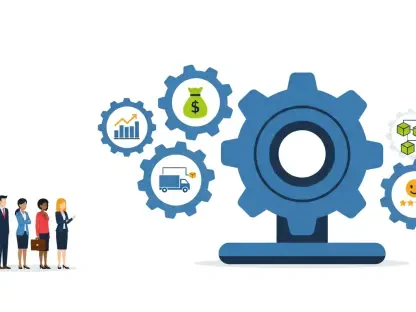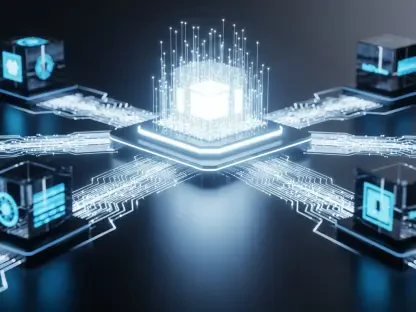In the rapidly shifting landscape of software development, a seismic transformation is underway, driven by the integration of artificial intelligence agents into DevOps practices. These advanced tools are dismantling the outdated, cumbersome structures of traditional workflows, fundamentally altering how teams conceptualize, develop, test, and deploy software solutions. Gone are the days of a sluggish, segmented process riddled with handoffs and inefficiencies that often led to delays and miscommunication. Instead, AI is forging a path toward a fluid, cohesive system that not only enhances operational efficiency but also fuels groundbreaking innovation. Tools like GitHub Copilot exemplify this shift, acting as more than mere assistants by becoming integral partners in the development process. This change is not a distant vision but a present reality, evidenced by remarkable adoption rates and tangible success stories across industries. As AI continues to redefine DevOps, it promises to lower costs, streamline operations, and elevate the developer experience to unprecedented levels.
Shattering the Traditional Relay Race Model
The conventional approach to DevOps has long mirrored a relay race, where distinct roles such as business analysts, developers, quality assurance teams, and operations personnel pass tasks sequentially, often resulting in significant time loss and diluted information. AI agents are revolutionizing this fragmented system by weaving together every stage of the software development lifecycle into a single, efficient workflow. Platforms like GitHub Copilot demonstrate this capability by enabling developers to execute multifaceted tasks through a single command, drastically reducing the time from ideation to deployment. What once demanded days or even weeks of coordination among various teams can now be accomplished in mere hours, minimizing errors and ensuring that critical details remain intact throughout the process. This integration marks a pivotal departure from siloed operations, allowing for a more agile and responsive development environment that aligns closely with modern business demands.
Furthermore, the impact of eliminating these handoffs extends beyond mere speed. By bridging the gaps between disparate phases of development, AI agents foster a collaborative atmosphere where insights and feedback are seamlessly shared across functions. This unified approach not only accelerates project timelines but also enhances the quality of the final product, as potential issues can be identified and addressed in real-time rather than after prolonged delays. The reduction in friction between teams also means that resources are allocated more effectively, preventing the bottlenecks that often plagued traditional models. As a result, organizations can pivot quickly to meet market changes or customer needs without being bogged down by procedural inefficiencies. This transformation underscores the profound potential of AI to redefine not just how software is built, but how entire development ecosystems operate in a competitive landscape.
AI’s Evolution into a True Development Partner
Initially, AI tools in DevOps served as supportive aids, offering suggestions for code snippets or automating minor tasks in a mode akin to pair programming. However, their role has dramatically evolved, positioning them as peer programmers capable of independently managing comprehensive workflows. From debugging intricate issues to generating full test suites and implementing new features, AI agents now handle responsibilities that once required extensive human oversight. This leap forward, seen in advancements like GitHub Copilot’s agent mode, signifies a fundamental shift in the dynamic between developers and technology, moving from passive assistance to active, autonomous contribution. Such capabilities allow teams to delegate significant portions of their workload, thereby redefining productivity standards within the DevOps sphere and setting new benchmarks for efficiency.
This progression also reshapes the skill sets and focus areas for developers. With AI taking on repetitive and time-consuming tasks, professionals can redirect their efforts toward more strategic and creative endeavors, such as designing innovative architectures or enhancing user experiences. The reduction in mundane workload not only boosts individual output but also fosters a more engaged and motivated workforce, as developers are empowered to tackle challenges that truly leverage their expertise. Moreover, the reliability of AI in executing complex processes ensures consistency in output quality, mitigating the risk of human error in critical areas like security or performance testing. As AI continues to mature in this peer-like capacity, it paves the way for a future where human ingenuity and machine precision coalesce to drive software development to new heights of excellence.
Agentic DevOps: A Holistic Workflow Transformation
The emergence of “agentic DevOps” represents a groundbreaking shift, where AI agents contribute across the entire spectrum of the software development lifecycle. From the planning stage, these agents analyze business requirements and propose actionable technical strategies, ensuring alignment between vision and execution. During prototyping, tools enable the rapid creation of functional applications from natural language inputs, bypassing lengthy manual processes. In coding and testing phases, AI manages implementation and security scans, while in operations, it autonomously monitors systems and resolves incidents, often without human intervention. This end-to-end integration diminishes the reliance on specialized teams for each phase, streamlining workflows and reducing the inefficiencies tied to constant handoffs between departments.
Beyond simplifying processes, agentic DevOps introduces a level of adaptability that traditional models could rarely achieve. AI agents can dynamically adjust to evolving project needs, whether by scaling resources during peak demand or identifying optimization opportunities in real-time. This flexibility ensures that development cycles remain agile, even as complexity grows, allowing organizations to maintain a competitive edge in fast-paced markets. Additionally, the automation of routine operational tasks, such as system monitoring or incident troubleshooting, frees up valuable time for teams to focus on innovation rather than maintenance. The comprehensive nature of AI involvement also enhances traceability, providing clear documentation of decisions and actions across the lifecycle, which is invaluable for audits or post-project analyses. This holistic approach is fast becoming a cornerstone of modern DevOps practices, redefining efficiency on a systemic level.
Economic Advantages and a Surge in Innovation
One of the most compelling benefits of AI agents in DevOps lies in their capacity to dramatically reduce the financial overhead associated with software development, echoing the transformative impact of cloud computing in earlier decades. By facilitating swift prototyping and feature validation, these agents lower the cost of experimentation, enabling startups to test novel concepts within hours rather than weeks. Larger enterprises, too, benefit from the ability to explore innovative solutions without incurring substantial financial risks, fostering an environment where bold ideas can flourish. This economic shift not only democratizes access to cutting-edge development practices but also promises to catalyze a new era of creativity and disruption within the software industry, as barriers to entry continue to erode.
Additionally, the cost efficiencies brought by AI extend to legacy system modernization and operational automation, areas traditionally burdened by high expenses and resource demands. Organizations can now update outdated infrastructure or streamline complex processes with minimal investment, thanks to AI-driven insights and automation capabilities. This financial relief allows for reinvestment into strategic initiatives, such as research and development or customer-focused enhancements, rather than being consumed by routine upkeep. The ripple effect of these savings is evident in accelerated time-to-market for new products and services, providing a tangible competitive advantage. As AI agents continue to drive down the total cost of ownership in DevOps, they lay the groundwork for sustainable growth, ensuring that innovation remains both accessible and economically viable for businesses of all sizes.
Real-World Success and Enhanced Developer Experience
The tangible impact of AI agents on DevOps is vividly illustrated by organizations achieving remarkable results through their adoption. Companies like Carvana have leveraged tools such as GitHub Copilot to transition from initial concepts to production-ready solutions in minutes, significantly enhancing their operational velocity. Similarly, Cathay has rolled out AI assistance to thousands of developers, resulting in faster delivery cycles and bolstered security measures across their projects. These examples highlight how AI not only accelerates workflows but also amplifies the capacity for innovation, allowing teams to redirect their focus toward high-value, creative tasks rather than getting bogged down in procedural minutiae. Such real-world outcomes affirm the transformative power of AI in reshaping development landscapes.
Equally important is the qualitative uplift AI brings to the developer experience, making the profession more rewarding on a personal level. By automating tedious chores like dependency updates, boilerplate code creation, and basic debugging, AI agents liberate developers to engage with the more fulfilling aspects of their craft, such as crafting intuitive user interfaces or solving complex architectural challenges. Furthermore, the automation of incident response systems reduces the stress of on-call duties, eliminating the need for late-night interventions and enabling teams to approach their work with renewed vigor and clarity. This focus on eliminating the draining elements of development fosters an environment where job satisfaction thrives, ultimately contributing to better software quality and more cohesive team dynamics. The dual benefit of efficiency and enjoyment marks a significant stride forward in the evolution of DevOps culture.
Looking Ahead: Building on AI-Driven Momentum
Reflecting on the strides made, it’s evident that AI agents have already begun to dismantle the inefficiencies of traditional DevOps models, replacing fragmented handoffs with seamless, integrated workflows. Their evolution into autonomous peers, capable of managing entire development tasks, has set a new standard for productivity, while the economic benefits mirror past technological revolutions like cloud computing. Real-world applications have demonstrated substantial gains for organizations, paired with a notable enhancement in developer satisfaction by alleviating mundane burdens. The rapid industry adoption of these tools has signaled their inevitable rise as a norm, fundamentally altering the fabric of software engineering.
Moving forward, the focus should shift toward harnessing this momentum to address emerging challenges and opportunities. Organizations must prioritize upskilling teams to collaborate effectively with AI agents, ensuring that human creativity remains at the forefront of innovation. Additionally, establishing robust ethical guidelines for AI use in DevOps will be crucial to maintain trust and security in automated processes. Exploring integrations with other cutting-edge technologies could further amplify the benefits, creating ecosystems where AI drives not just efficiency but also groundbreaking advancements. As the landscape continues to evolve, staying agile and open to experimentation will be key to maximizing the potential of this transformative force in software development.









